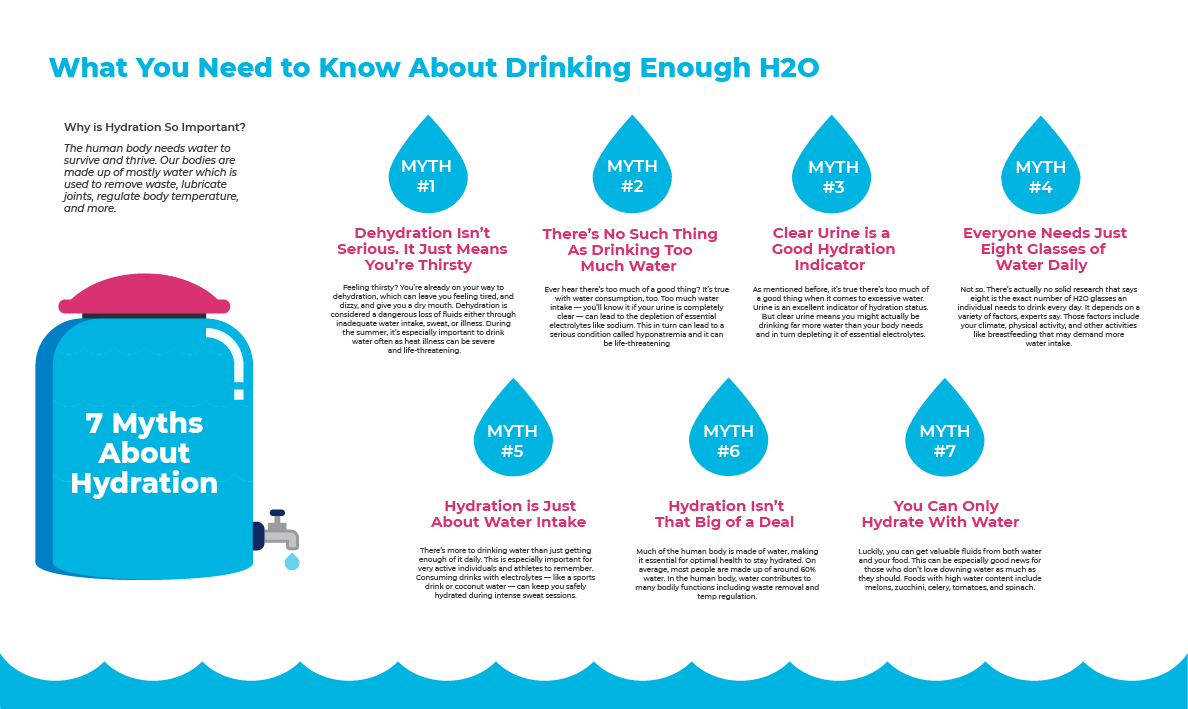Debunking Common Myths About Drinking Water: Separating Fact from Fiction

Introduction: Water is often hailed as the elixir of life, essential for maintaining our health and well-being. However, amidst the wealth of information available about hydration, certain myths and misconceptions about drinking water abound. In this article, we’ll debunk some of the most common myths surrounding hydration, separating fact from fiction to help you make informed decisions about your water intake.
- Myth: You Need to Drink 8 Glasses of Water a Day:
- Fact: The notion that everyone needs to drink precisely eight glasses of water each day is a myth. The optimal amount of water intake varies depending on factors such as age, weight, activity level, climate, and overall health.
- Discuss how individual hydration needs differ and emphasize the importance of listening to your body’s thirst cues as a reliable indicator of when to drink water.
- Myth: Clear Urine Indicates Proper Hydration:
- Fact: While clear urine is often associated with adequate hydration, it’s not always the case. Urine color can be influenced by factors such as diet, medications, and certain health conditions.
- Explain that pale yellow urine is generally a sign of adequate hydration, but overly clear urine may indicate overhydration, while dark yellow urine could suggest dehydration.
- Myth: Caffeinated Beverages Cause Dehydration:
- Fact: Contrary to popular belief, moderate consumption of caffeinated beverages like coffee and tea does not lead to dehydration. While caffeine has mild diuretic effects, the fluid content of these beverages more than offsets any water loss.
- Clarify that caffeinated drinks can contribute to overall fluid intake and hydration, but excessive consumption should be avoided, as it may have other health implications.
- Myth: You Can’t Overhydrate:
- Fact: While staying adequately hydrated is essential for health, it’s indeed possible to overhydrate, a condition known as hyponatremia or water intoxication. Drinking excessive amounts of water without sufficient electrolyte intake can dilute sodium levels in the blood, leading to potentially serious health consequences.
- Highlight the importance of moderation in water intake and the significance of electrolyte balance for proper hydration.
- Myth: You Need to Drink Bottled Water for Safety:
- Fact: Tap water in most developed countries undergoes rigorous testing and treatment to ensure safety and quality. In many cases, tap water is subject to stricter regulations than bottled water.
- Encourage readers to trust their municipal water supply and invest in a reusable water bottle to reduce plastic waste and environmental impact.
Conclusion: By debunking common myths about drinking water, we can empower ourselves to make informed choices about hydration and prioritize our health and well-being. Remember that hydration needs are individual and can vary based on various factors. By listening to our bodies, staying informed, and adopting healthy hydration habits, we can enjoy the numerous benefits of proper hydration without falling prey to misconceptions.
Tags
What do you think?
Related Articles

The Link Between Water and Weight Loss: How Hydration Can Support Your Fitness Goals
Introduction: In the hustle and bustle of daily life, amidst the flurry of work deadlines, family commitments, and social engagements, it’s easy to overlook one

The Environmental Impact of Bottled Water: Why You Should Make the Switch to Tap
Introduction: Bottled water has long been marketed as a convenient and refreshing choice for staying hydrated on the go. However, behind its convenience lies a

Exploring Different Types of Water Filtration Systems: Which One is Right for You?
Introduction: With concerns about water quality on the rise, many people are turning to water filtration systems to ensure that their drinking water is clean,
